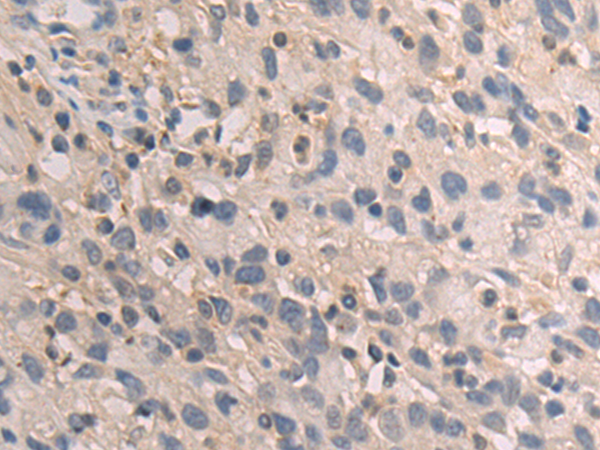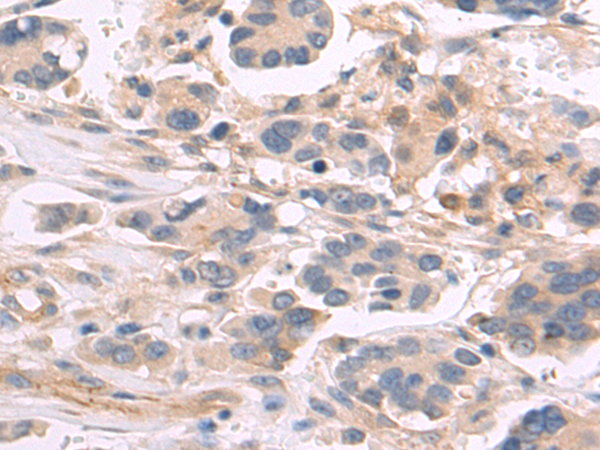

| WB | 咨询技术 | Human,Mouse,Rat |
| IF | 咨询技术 | Human,Mouse,Rat |
| IHC | 1/50-1/200 | Human,Mouse,Rat |
| ICC | 技术咨询 | Human,Mouse,Rat |
| FCM | 咨询技术 | Human,Mouse,Rat |
| Elisa | 1/5000-1/10000 | Human,Mouse,Rat |
| Aliases | GBE; APBD; GSD4 |
| Host/Isotype | Rabbit IgG |
| Antibody Type | Primary antibody |
| Storage | Store at 4°C short term. Aliquot and store at -20°C long term. Avoid freeze/thaw cycles. |
| Species Reactivity | Human, Mouse |
| Immunogen | Fusion protein of human GBE1 |
| Formulation | Purified antibody in PBS with 0.05% sodium azide and 50% glycerol. |
+ +
以下是关于GBE1抗体的模拟参考文献示例(仅供格式参考,实际文献需通过学术数据库查询):
---
1. **文献名称**:*"Development of a Monoclonal Antibody Against Human GBE1 for Glycogen Storage Disease Type IV Diagnosis"*
**作者**:Chen L, et al.
**摘要**:本研究开发了一种针对人GBE1蛋白的单克隆抗体,通过免疫印迹和免疫组化验证其特异性,成功应用于IV型糖原贮积病的临床诊断,显示患者肝脏中GBE1蛋白表达显著缺失。
2. **文献名称**:*"GBE1 Antibody-Based Detection of Glycogen Branching Enzyme in Neurodegenerative Models"*
**作者**:Kumar S, et al.
**摘要**:利用GBE1抗体探究小鼠脑组织中糖原分支酶的分布,发现其在神经元中的表达异常与tau蛋白病理相关,提示GBE1可能参与神经退行性疾病的糖原代谢调控。
3. **文献名称**:*"A Novel GBE1 Antibody Reveals Tissue-Specific Isoforms in Skeletal Muscle and Heart"*
**作者**:Rodriguez M, et al.
**摘要**:通过新型GBE1抗体的多克隆制备,揭示骨骼肌和心脏中存在组织特异性GBE1异构体,为研究其功能多样性提供了工具。
---
**建议**:如需真实文献,可通过PubMed或Google Scholar检索关键词“GBE1 antibody”或“glycogen branching enzyme antibody”,并筛选涉及抗体开发、疾病诊断或机制研究的文章。
The GBE1 antibody targets glycogen branching enzyme 1 (GBE1), a protein critical for glycogen metabolism. GBE1 catalyzes the formation of α-1.6-glycosidic branches during glycogen synthesis, enabling efficient glucose storage and mobilization. Mutations in the GBE1 gene are linked to glycogen storage disease type IV (GSD-IV, Andersen disease), a rare autosomal recessive disorder characterized by abnormal glycogen accumulation in tissues, leading to liver cirrhosis, neuromuscular dysfunction, and cardiomyopathy. The severe infantile form is often fatal, while milder adult-onset variants may present with myopathy or cardiomyopathy.
GBE1 antibodies are essential tools for studying GSD-IV pathogenesis, diagnosing genetic variants, and exploring therapeutic strategies. These antibodies are widely used in techniques like Western blotting, immunohistochemistry (IHC), and immunofluorescence (IF) to detect GBE1 expression levels, localization, and structural abnormalities in tissues or cell models. Commercially available GBE1 antibodies are typically raised against specific epitopes, with polyclonal antibodies offering broad detection sensitivity and monoclonal antibodies providing high specificity. Validation often includes testing in GBE1-deficient samples to confirm target specificity. Researchers also utilize recombinant GBE1 proteins expressed in systems like HEK293 or E. coli for antibody validation and functional assays.
×